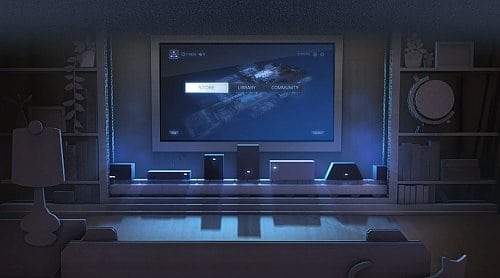Last week we bore witness to 3 rather interesting announcements from Valve and Steam. No it’s not that game. Rather Valve announced an expansion to the Steam Universe, and it’s into the living room. With the SteamOS, Steam Machines, and the Steam Gamepad, Valve is bringing the PC into the console gaming ring. They are poised to become a very strong competitor to not only the last generation of consoles, but the upcoming generation (PS4 and Xbox One). Thanks to the adaptability of the PC platform, all further generations of console systems are on notice too. It’s a great time to be a gamer, and a PC gamer especially.
There have been rumours of such a thing coming from Valve for a while. In hindsight their attempt to bring Steam to the PS3 in 2010 could almost be seen as a soft launch for these new products. The E3 2010 announcement of SteamWorks on the PS3 was greeted with a lot of fanfare and excitement. Having Portal 2 launch on all platforms was a great day for gaming, but it and CS:GO are the only major titles we’ve seen come out for SteamWorks on the PS3. The few folks I know in the industry would blame this on the PS3 being a very difficult platform to do dev for. Microsoft doesn’t even enter into this discussion; since they are quite content with the walled garden that is Xbox Live.
Some excitement is also built from the events that have occurred outside of Valve and their former partners. First you have silly comments like the one made by EA CIO Rajat Teneja, where he went on record as saying that the architectures of the Xbox One and PlayStation 4 are “a generation ahead of the highest end PC on the market.” Yeah we’ve heard that before, with the launch of every modern console since at least the PlayStation. In a normal product launch cycle that does tend to be true…for about 6 months. That’s the point at which either CPU or GPU tech leap-frog over the consoles. The Steam Living Room completely disrupts this cycle, since now the fastest PC available is also the fastest console available.
NVIDIA has come out saying the opposite of what EA had to say, and basically asserting that last sentence. In that past 3 console generations NVIDIA’s tech has been absent from most of the consoles available. In a recent interview NVIDIA Senior VP Tony Tamasi said the he now believes that it is “no longer possible for a console to be a better or more capable graphics platform than the PC.” This came on the final day of the Steam announcements, when they revealed their game pad. Now it should be obvious that NVIDIA’s Shield technology is playing a big part in Steam’s new products. NVIDIA has understandably turned up their noses at that this newest generation of consoles, and instead partnered with Steam to make this new initiative happen. Both Valve and NVIDIA are huge movers in the gaming industry, and having them team up like this makes that playing field just a little more interesting.
So where does this leave you and I; the average PC gamer? Well I’d say we’re in a great position. Valve has positioned Steam and the Steam Living Room as at the very least an incredible 3rd contender for the console market. If everything goes well at launch, they might even be able to make the likes of Microsoft and Sony a little more worried than they thought they could be. The features and adaptability of this new platform are very tantalizing, and I am very excited to see what the future holds for the couch.
So now I turn it back to you. What do you think of this new Steam console? How much of a bite do you think this could take out of the Xbox One and PlayStation 4?


